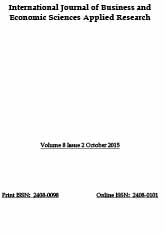Influencing Factors on Earnings Management, Empirical Evidence from Listed German and Austrian Companies
Influencing Factors on Earnings Management, Empirical Evidence from Listed German and Austrian Companies
Author(s): Thomas Dilger, Sabine GraschitzSubject(s): Economy, National Economy, Business Economy / Management
Published by: Τεχνολογικό Εκπαιδευτικό Ίδρυμα Ανατολικής Μακεδονίας και Θράκης
Keywords: Earnings Management; Accounting Standards; Scaling Variables; Earnings Distribution
Summary/Abstract: Purpose – Since the 1960s earnings management has been a widely researched area and became presumably known by the current accounting scandals. This paper aims at empirically showing which factors affect earnings management. Design/methodology/approach – According to former research literature factors are derived, which might influence the companies' earnings management behavior. These factors are the applied accounting standard, the industry sector and the country of official quotation. Although several measurements for earnings management like abnormal accruals or income smoothing exist, this paper is predominantly using the distribution of net income scaled by total assets (RoA) respectively total sales (RoS) as earnings management measure. These earnings management measures have been selected as they can measure the frequency of earnings management in reality and no estimates are necessary. Findings – In general, analyses show that the distribution in earnings management intervals differ from the total population. Most noteworthy is that by adoption of principle-based accounting standards (IFRS/US-GAAP), in case of this study no differences of earnings quality was observable. The other two variables yield in mixed results due to the robustness checks, which indeed questions the scaling variables for data-sets including the financial industries. Research limitations/implications – First, according to the chosen measurement parameter no distinct assertion concerning the reasons for execution or non-execution of earnings management can be deduced. Second, the method of earnings management's identification is not dividable and therefore real-, accounting-, legal- and illegal- earnings management cannot be identified. Third, the research results are just partially generalizable concerning representativity (e.g. other countries, non-market listed companies) and taken for granted just for similar data-sets. Originality/value – Although prior studies presume a rise in earnings quality, which indicates a decrease in earnings management by the adoption of principle-based accounting standards (IFRS/US-GAAP) in comparison to national GAAP, there is no difference or superior accounting standard identifiable through the results.
Journal: International Journal of Business and Economic Sciences Applied Research (IJBESAR)
- Issue Year: VIII/2015
- Issue No: 2
- Page Range: 69-86
- Page Count: 18
- Language: English

